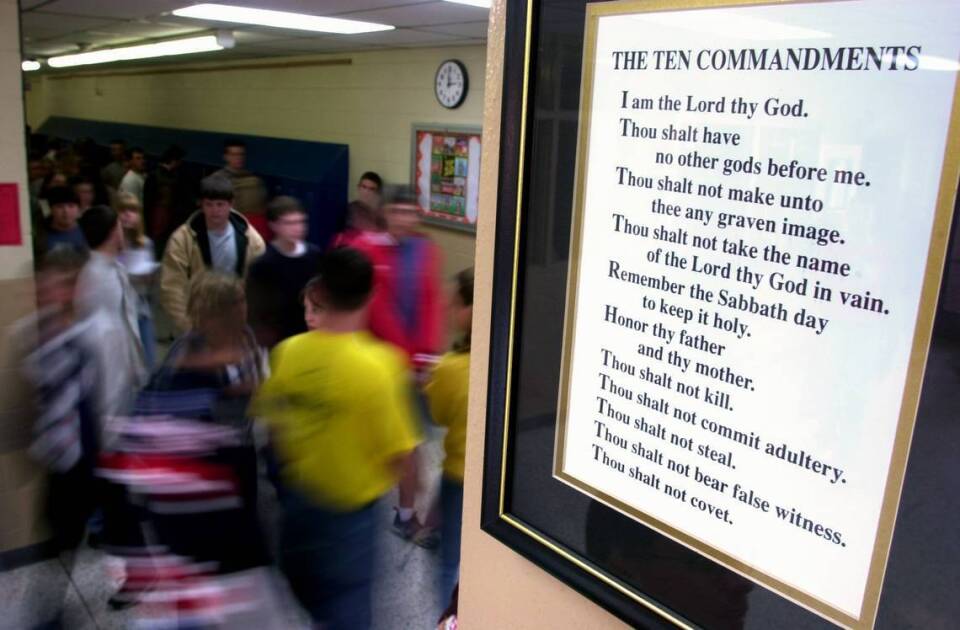A federal judge has temporarily blocked a new Texas law requiring classrooms to display the Ten Commandments—at least in 11 school districts for now.
The law was due to take effect Sept. 1, but the preliminary injunction issued Wednesday by U.S. District Judge Fred Biery of San Antonio blocks the requirement in the Austin and Houston school districts, as well as in nine others across the state.
The law, known as S.B. 10, “impermissibly takes sides on theological questions and officially favors Christian denominations over others,” said Biery, an appointee of President Bill Clinton.
The ruling means all three states that have passed similar laws have now had those measures ruled likely unconstitutional and blocked from taking effect in at least some districts.
Earlier this month, a federal judge in Arkansas blocked that state’s law in four districts. Louisiana’s law was blocked statewide by a district judge last November, and in June, a three-judge panel of the U.S. Court of Appeals for the 5th Circuit, in New Orleans, upheld the preliminary injunction.
Louisiana state officials have asked the full 5th Circuit to rehear the case over that state’s law. Both Louisiana and Texas are in the 5th Circuit, while Arkansas is in the 8th Circuit. Any definitive ruling by the 5th Circuit will likely determine the fate of the Louisiana and Texas laws, barring any intervention by the U.S. Supreme Court.
Judge relies on precedent from Louisiana
In his Aug. 20 opinion in Nathan v. Alamo Heights Independent School District, Biery concluded that the Louisiana and Texas laws are similar enough that he was bound by the 5th Circuit panel’s decision blocking the Louisiana law.
Both state laws require public schools to display the same Protestant version of the commandments. Districts are not required to pay for the posters, though they may do so or accept donated copies—offers national groups have already made.
Among the few differences between the two laws are the required size of the displays (a minimum of 11×14 inches in Louisiana and 16×20 inches in Texas), and that the Louisiana law requires an accompanying context statement asserting that the Ten Commandments “were a prominent part of American public education for almost three centuries,” while the Texas law does not.
Biery said it was clear enough from statements by legislators supporting the Texas law that they had an impermissible religious purpose for enacting it.
A lead Texas House sponsor of the measure said, “It is incumbent on all of us to follow God’s law, and I think that we would be better off if we did.”
Why the Texas law fails church-state tests
Even if he was not bound by the 5th Circuit’s decision in the Louisiana case, Biery signaled he would find the Texas law unconstitutional under his own legal analysis.
The judge provided a lengthy overview of the American tradition of separation of church and state, weaving in quotes from founding fathers Thomas Jefferson andBen Franklin, actress Greta Garbo, theoretical physicist Stephen Hawking, and the country singer Kenny Chesney.
Biery agreed with the 5th Circuit panel that Ten Commandments displays are unconstitutional under the Supreme Court’s 1980 decision in Stone v. Graham, which struck down a Kentucky law similar to the recent wave of state statutes. He also agreed that the Texas law violates the test set forth by the high court in Kennedy v. Bremerton School District, the 2022 case that upheld a high school football coach’s right to pray after games, because Ten Commandments displays were not part of a broad tradition at the time of the nation’s founding.
“There is … insufficient evidence of a broader tradition of using the Ten Commandments in public education, and there is no tradition of permanently displaying the Ten Commandments in public school classrooms,” Biery said.
The judge found that the Texas law likely violates both the First Amendment’s prohibition on government establishment of religion and its guarantee of free exercise of religion.
Potential impact on families and students
Biery cited plaintiffs’ accounts—including Jewish, atheist, agnostic, and interfaith parents—warning that state-mandated displays could stigmatize their children.
The judge said the signs were “likely to send an exclusionary and spiritually burdensome message to the child-plaintiffs—who do not subscribe to the approved version of the Ten Commandments—that they are outsiders who do not belong in their own school community.”
Rabbi Mara Nathan of San Antonio, a lead plaintiff in the suit brought by the American Civil Liberties Union, its Texas affiliate, Americans United for Separation of Church and State, and the Freedom From Religion Foundation, praised the preliminary injunction.
“As a rabbi and public school parent, I welcome this ruling,” Nathan said in a statement. “Children’s religious beliefs should be instilled by parents and faith communities, not politicians and public schools.”
Texas Attorney General Ken Paxton, a Republican whose office is defending the law on behalf of the school district defendants, said in a statement, “The Ten Commandments are a cornerstone of our moral and legal heritage, and their presence in classrooms serves as a reminder of the values that guide responsible citizenship. Texas will always defend our right to uphold the foundational principles that have built this nation, and I will absolutely be appealing this flawed decision.”
There is a separate lawsuit against the Texas law pending in federal district court in Dallas, naming Texas Commissioner of Education Mike Morath, the Texas Education Agency, and three other school districts as defendants.
2025-08-20 22:07:09
Source link

